|
|
Through the years, America's Public
Broadcasting System has curiously made a point of presenting one-sided
broadcasts, as a mouthpiece for Armenians. This is a particular shame, as PBS
is... in theory... not supposed to be beholden to one point of
view, and is meant to represent the entire American public. Commercial
television stations could be influenced by their sponsors; PBS as well is
likely aware of not putting off wealthy Armenian financial sources, such as
The Manoogian Foundation... which is almost always credited as being behind
PBS Armenian programs.
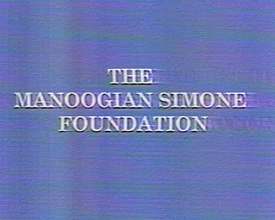
("Simone" is the married name of a daughter)
One recent example, from 2002, was
called "The Armenians, A Story of Survival"
ADDENDUM: The producer of the
program contacted me and corrected me on the title, which I had
mistakenly referred to as ARMENIA: SURVIVAL OF A NATION, figuring it was
based on Christopher Walker's book. If you were directed here from
another page with this incorrect title, now you'll know why.
|
|
|
|
| Here
are a few highlights from the program, followed by Holdwater's thoughts, in yellow. |
Narrator: "Although relations (between the
Armenians and Ottoman Turks) were never completely harmonious, The Ottoman Turks, by the
early 19th Century, referred to the Armenians as 'The loyal citizens of the Empire.'
"
What does "completely harmonious" mean? The four centuries
(along with the two previous centuries under non-Ottoman rule) in which the Armenians
co-existed with the Turks earlier than the Nineteenth Century (before Armenians
began stirring up trouble, encouraged by the independence of other minorities), the Armenians not only were free to do as they
could like any other citizen (with slight
restrictions... nothing compared to the restrictions for Moslems in Christian European
nations of the period, where Moslems were generally not even regarded as human beings),
but prospered... compared to the ordinary Turk. Sounds like a relatively happy existence
to me.
 |
|
Don't Cry
for Me, Armenia...?
|
For example, in earlier centuries, the Armenian historian, Mathias of
Edessa wrote (in Chronicles,
Nr. 129):
"(Turkish Sultan) Meliksah's heart is full
of affection and goodwill for Christians, he has treated the sons of Jesus Christ very
well, and he has given the Armenian people peace, affluence and happiness"
The program unfairly tries, of
course, to instill the idea that the Armenians were somehow oppressed. (How were the
Armenians treated under the Byzantines and all the other entities that ruled them before
it was the Turks’ turn? Were the Armenians allowed to rise up to the top ranks in
virtually any endeavor in those other societies? Read in particular the first two
paragraphs under "Trusted
Armenians in the Ottoman Empire," for examples. Compare also to oppressed peoples
in later centuries, such as American blacks until the middle of the 20th Century. Were
blacks allowed to rise to America's top ranks in much more enlightened times?)
|
The Turks Viciously Attack the Poor Russians
|
As W.W.I erupted, the Ottoman Turks, as
planned, launched a major military campaign against the Russians on the Northeastern
front. Armenians found themselves on both sides of that front.
Wasn’t it Russia that declared war on the Ottoman Empire?
(Granted, with the provocation of German-manned Turkish vessels sinking a Russian
gunboat, acting on their own to push the Ottomans into war.) And wasn’t it Russia
that harassed its weaker neighbor, “The Sick Man of Europe,” with constant wars
the century or so prior... significantly leading to the empire's decline? While it’s
true Enver Pasha took the initiative with a campaign that would ultimately prove
disastrous, the wording makes it sound like the poor Russians were lying helplessly
in the wake of the aggressor Turks. (Czar Nicholas confidently "annexed"
"Constantinople" at the beginning phase of the war, aware of how weak his
neighbor was.) Obviously, the program also insinuates that the poor Armenians were
innocent bystanders with no part to play in the conflict... instead of playing the
active role they did, making an arrangement with Russia to stab their own nation in
the back.
"Hostilities
were opened by the Russians, who pushed across the border on November 1, 1914,
though the Ottomans stopped them and pushed them back a few days later. On December
21 Enver personally led the Third Army in a counterattack."
Stanford & Ezel
Kural Shaw, History of the Ottoman Empire and Modern Turkey, Vol. II.
|
| Christopher Walker |
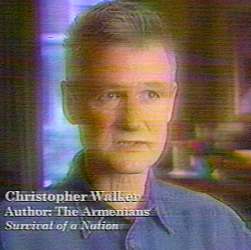 |
|
The
Armenophiliac Author |
Christopher Walker (author, The Armenians, Survival of a Nation):
“The Ottoman Armenians had agreed to support the Ottoman
Empire, and the Russian Armenians had agreed to support the Russian Empire.”
With this one sentence (which you will hear, if you click above),
Christopher Walker blows away whatever little credibility he has. How dare he make such a bald-faced lie? Unlike the absence of
definitive evidence that there was a state-sponsored genocide committed upon the Armenian
people, there are volumes of
evidence that proves the Armenians were the Benedict
Arnolds of their country... and a good amount from the Armenians themselves. Either Mr. Walker is the most incompetent
researcher who was ever born, or he has a prejudiced agenda to fulfill.
ADDENDUM, Oct. 2006: In a sense, Mr. Walker's statement is not
entirely untrue, because Ottoman-Armenians did agree to support their nation, as K. S.
Papazian can tell you. The problem is,
the Armenians did not keep their promise, and the problem with Mr. Walker is that he chose
to let viewers believe the Armenians of the Ottoman Empire were generally loyal. The
reality actually was that distinctions such as "Russian" or "Ottoman"
were irrelevant; the Armenians were only loyal to Hai Tahd, the Armenian Cause, no
matter which nation they happened to be residing in. (Or, as Prof. Justin McCarthy put it
in p. 26 of "Death and Exile": "Armenians under Russian and
Ottoman rule obviously viewed each other as brothers, no matter their citizenship.")
"Although most Armenians maintained a
correct attitude vis-à-vis the Ottoman government, it can be asserted with some
substantiation that the manifestations of loyalty were
insincere, for the sympathy of most Armenians throughout the world was with
the Entente, not with the Central Powers. By autumn 1914, several prominent Ottoman
Armenians, including a former member of parliament, had slipped away to the Caucasus
to collaborate with Russian military officials."
Richard Hovannisian, "Armenia on the Road to
Independence," 1967, p. 42
"...In the early part of 1915, therefore, every Turkish city contained
thousands of Armenians who had been trained as soldiers and who were supplied with
rifles, pistols, and other weapons of defense. The operations at Van once more
disclosed that these men could use their weapons to good advantage..."
Henry Morganthau, U.S.
Ambassador to the Ottoman Empire, Ambassador Morgenthau's Story, Doubleday, 1918,
page 301
|
If any of the two parties behaved genocidally, it was the Armenians. There is irrefutable
evidence, for example, that the Turks tried to protect the relocating Armenians, and
punished the Turks who behaved criminally... even by execution! (In 1915, twenty Ottoman
Turks were put to death by their own government, for crimes against the Armenians; not
imprisoned, but put to death. Imagine Hitler laying any kind of punishment on an SS
man, for mistreating the Jews. Bear in mind as well that Lt. Calley's American punishment
for the My Lai Massacre was only three days' imprisonment, followed by house
arrest.) Meanwhile, whatever Muslim village came under the Armenians’ control, they systematically cleansed the village of
every man, woman and child. (In hopes of laying the foundation of an ethnically pure
state... and they certainly succeeded with what is Armenia today; the Muslims were the
majority, not that long ago.)
I vote France bring Christopher
Walker to trial for making such inaccurate statements in cases that involve genocide
against Turks and Muslims.
Narrator: But since some Armenians in Russia, were in fact, fighting against the Ottoman
Turks, the Young Turks feared the Armenians in their own empire might join the Russian
enemy. The Ottoman Turks then began a campaign to remove what they considered to be
"The Armenian Threat" within their own borders.
Poor, innocent Ottoman Armenians. Why, it sounds like they were no
different than Japanese-Americans in W.W.II America, who were relocated... and, worse,
placed in concentration camps... with barely any evidence of supporting the enemy.
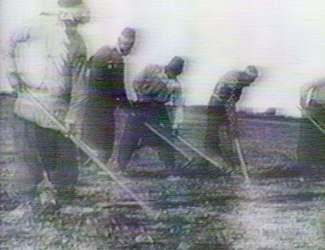 |
|
I guess this
shot from the program is supposed to lend
"evidence" to the "pre-prepared graves." |
Walker: The entire Armenian community of Anatolia
was uprooted and either shot on the spot, or driven to the desert to die. The men were
driven from their towns and villages, and shot a few miles outside and their bodies were
buried in pre-prepared graves. The women and children were forced to walk over the
mountains, into the deserts, and were left to die in terrible circumstances. The
authorities said that they were going to new locations, new towns, but these were complete
fantasies; they were just dumped in the desert to die.
Christopher Walker has already lost complete credibility with his
earlier statement, so anyone who takes whatever he says at face value would be a fool. I
haven't read his book, but he has obviously chosen to take his information almost
completely from Armenian sources.
So the new locations the Armenians were taken to
were “complete fantasies,” ehhh? American Rear Admiral Colby Chester wrote, "In due
course of time the deportees, entirely unmassacred and fat and prosperous, returned (if
they wished so to do), and an English prisoner of war who was in one of the vacated towns
after it had been repopulated told me that he found it filled with these astonishing
living ghosts." Oh, Chris. Of what value is a man who has no honor?
(Addendum: After writing the above, I came
across Dr. Heath Lowry's examination of a sample of Mr. Walker's work. Dr. Lowry is very
kind to conclude Christopher Walker merely suffers from "poor scholarship." Does
Dr. Lowry's summation come out of thin air? Judge
for yourself, at the risk of injuring your jaw from dropping when you realize the
extent of the British author's unprofessional methodology.)
WALKER: "...The women and children were
forced to walk over the mountains, into the deserts, and were left to die in
terrible circumstances."
"...[T]he Armenians were moved ... to
the most delightful and fertile part of Syria. Those from the mountains were taken
into Mesopotamia, where the climate is as benign as in Florida and California,
whither New York millionaires journey every year for health and recreation. All this
was done at great expense of money and effort, and the general outside report was
that all, or at least many, had been murdered. "
Rear Admiral Colby M. Chester, Turkey Reinterpreted, The New York
Times Current History, 1922
"All sources confirm that, for
instance, they say they were exiled to Mesopotamia. I don't know if you've been
there. Armenians claim Mesopotamia is a desert and people were exiled there. In
fact, the places they were exiled to like Aleppo, Dayr al-Zor, southern Urfa and
Mosul provinces were located within the region called the Fertile Crescent. I
don't agree with the term "desert" they use to arouse pity. That region is
not a desert at all."
Prof.
Kemal Cicek, "The Ottoman Armenians: The Question of Relocation and Immigration
During WWI," 2005
Regarding Walker's irresponsible claim that the Armenians were
"left to die": an Armenian representative reported to Ambassador
Morgenthau himself that half a million Armenians had "already settled down to
business" and were "earning their livings," by September of 1915. The
contemptible ambassador was later quoted (by Vahan Cardashian, in a March 3, 1916
letter to Lord Bryce) as saying Armenians were found in good numbers in almost all
the interior cities of Turkey, and that the attitude of the Government was passive. (The
Armenian Review, Winter 1957, p. 107.) It must be said that Armenians did die of
famine and disease as the years dragged on, in a bereft nation where U.S. Consul
Leslie Davis had written bread as almost unobtainable since before the war. Many
Muslims were similarly "left to die in terrible circumstances." If this is
the criteria, why does Walker not charge the Ottoman government with committing a
genocide against the Turkish people? What unfair, simple-minded, prejudiced
statements.
|
|
Leslie Davis
|
Another eyewitness, Leslie Davis, the United States foreign
consul in the Harput region of Turkey from 1915 to 1917, documented everything he
saw, including an experience at a nearby lake.
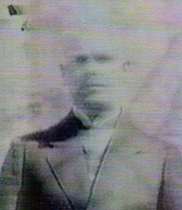 |
|
Leslie
Davis |
In 1915... thousands of Armenians, mostly innocent and helpless
women and children, were butchered on the shores and barbarously mutilated. (Cue
sad music.)
Leslie Davis’ observations also formed the most “valid”
basis for the genocide segment of the other PBS program we’re exploring, “The
Great War.” So Leslie Davis is an Armenian “Big Gun,” in their quest to
brainwash people into believing there was a "Nazi"-style genocide. I
always pay attention to what non-Armenian and non-Turkish observers of the period
had to say. (There are, for example, reports from Germans... the Ottomans’ allies... that make me
think. I read about them mostly from Armenian web sites. Armenian web sites,
unfortunately, follow the same principles as Christopher Walker, and you can trust
them as far as you can throw them.)
However, when one encounters Western "eyewitness" accounts describing
atrocities against the Armenians, two things have to be kept in mind: first, many
Westerners entered this scene with a bigotry against the Turks firmly established.
Some of these racist observers, like Ambassador Morgenthau, relied on biased
third-party accounts (missionaries, Armenians) and reported them as their own.
Secondly, there is no denying Armenians were massacred, many by Kurds who were
getting back at the Armenians who slaughtered the mainly Kurdish people who lived in
these regions, and also by Arab bandits. However, if Leslie Davis reported
accurately of innocent Armenians getting butchered , that is not evidence of a
state-sponsored genocide.
The program makes it sound
like Leslie Davis was standing around, witnessing the butchery of "thousands of
Armenians." Is that credible? If the parties doing the massacres were
government representatives — as is the implication here — ...would the Turks
have told the American consul, Oh, here, have a ringside seat while we get on with
our bloody business? There is no question that Mr. Davis... like Ambassador
Morgenthau... simply swallowed the horror stories missionaries and Armenians
were only too happy to tell him. (Leslie Davis did take a stroll or two away from
the comforts of his consular office, and saw corpses here and there, unlike many of
his co-consuls and Morgenthau. Massacres were committed by both sides in the
intercommunal civil war, and the Turks never hid the fact massacres took place...
unlike the Armenians, who won't admit they gave defenseless Turkish villagers as
much as a nosebleed. Dead corpses, however, do not prove there was a
government-sponsored extermination policy. Think: My Lai.)
More on Mr. Davis and other American consuls.
A genuine foreign eyewitness who made it his
business to observe
|
| "The
Turkish Government"... Again |
 |
|
Or
victim of the desperate times? |
The Turkish government today denies a genocide took place... and lobbies foreign
governments and journalists, urging them to express the Turkish side. But when our
producers asked to interview a representative of the Turkish government, their
spokesperson refused; unless given up to nine full minutes of uncut, and
uninterrupted, air time.
There is that “Turkish government” bugaboo again! Hey. It’s
NOT just the Turkish government that denies a genocide took place.... there are many
impartial scholars and historians who do
as well, braving Armenian reprisals
against their credibility or even their lives! As far as the Turkish government’s
finally taking the steps to present the truth after the Turks’ image got
relentlessly battered for nearly a century, and even earlier.... when the Armenians,
Greeks and other Turk-haters were the only voices being heard... it’s about time.
Naturally, the insinuation here is the Armenian “Genocide” is irrefutable, and
the Turkish government is evilly engaged in challenging the Armenian “truth.”
There has to be some force to counter the exceptionally well-financed Armenian
organizations, and the smaller numbers of settled Turks in countries like America
don’t have the comparative wherewithal or appetite to harp on this issue as
obsessive Armenians do. On one hand, Turks are generally more apathetic, which is
unfortunate; but they’re also trying to live their lives and not get hung up on
the events of nearly a century ago.
Regarding the government spokesperson who gave his or her condition, my God! He or
she would have been stupid not to. An interview can be taken and edited in such a
manner to have the opposite effect of the actual spoken message.
A few years ago, there was a report on “60 Minutes” by Ed Bradley, which
I believe was exploring the Kurdish issue.
The program had naturally made up its mind that the Turks were the villains, but
made the effort to interview one person to represent the counterpoint. This person
happened to be a representative of the Turkish government... and his shots were
mostly filmed in extreme close-ups. When his face was seen as taking up the screen
while the other interviewees were composed in a normal head and shoulders manner...
what do you suppose the effect was? There is definitely something more jarring about
an extreme close-shot; it could present the effect that a person has something to
hide, capturing the slightest twitch in a more magnified fashion. There are ways for
filmmakers with an agenda to make a subject appear to lack credibility.
|
| Elie Wiesel |
Elie Wiesel: To have an entire country, an entire
nation, to say it didn't happen... it pains. It's an insult, it's an offense to memory,
it's an offense to dignity, it's an offense to humanity... to the humanity of the
Armenians.
 |
|
Holocaust
Man
|
Well... Elie Wiesel is another “Big Gun” of the
Armenians, especially since he, as a famous Holocaust survivor, gives that all important
connection to the Holocaust, just like the presumed Hitler Quote. I don’t know how much
research Mr. Wiesel has done... I fear he is so genocide-sensitive, he has accepted the
Armenian version of events without asking too many questions. (It’s hard to shake a
version of events that has been bombarded, unchallenged, for nearly a century. It becomes
part of one’s deeply-rooted belief system.) Probably Elie Wiesel has bought into the “Of
course, the Turks were known barbarians” symptom, and he chooses to believe what he
prefers to believe.
Let’s examine Mr. Wiesel’s words: “To have an entire country, an entire nation, to
say it didn't happen... it pains. It's an insult, it's an offense ...” To say WHAT didn’t
happen? Turks are the first to acknowledge Armenians were massacred. By contrast, how many
Armenians acknowledge they massacred Turks, Kurds and other Muslims? Mr. Wiesel... why are
you not applying this very same criteria to the Armenians? When Armenia and the Armenian
Diaspora refuse to admit "it" didn’t happen... it pains. It’s an insult, it’s
an offense... unless you feel Turkish lives are somehow more meaningless. I refuse to
believe you would think that way, which makes me conclude.... you just didn’t care to do
your homework.
Naturally, what Elie Wiesel is talking about when he says "it" is... genocide.
Well, no matter how much you believe the Ottoman Turks systematically tried to wipe out
the Armenian people... if there’s a mountain of objective evidence that says "it" didn’t
happen, then it’s the DUTY of honorable people not to give in to politically correct
pressure. On the other hand, there is irrefutable evidence that the Armenians DID act
genocidally. What’s painful is that someone with the surface sensitivity of Elie Wiesel
looks at the world in such a black and white way: the Armenians wear the white hats, the
Turks wear the black hats. (Well, we can't blame Mr. Wiesel too much, since that's the way
practically every other brainwashed Westerner observes the equation; however, Elie Wiesel
bears a greater responsibility to be objective... since he comes across as being so
"sensitive," for one.)
Perhaps Elie Wiesel doesn’t exactly understand the meaning of the word
"genocide," as defined
by The 1948 United Nations Convention on the Prevention and Punishment of the Crime of
Genocide. Now, that would be ironic.
It’s even more ironic that the Nobel Prize winning "Champion of the
Holocaust," Elie Wiesel, is so eager to give the Holocaust connection to a people
whose sense of identity unfortunately thrives on it. In doing so, Elie Wiesel cheapens the
meaning of the Holocaust. What should be kept in mind is that Elie Wiesel is not the only
"voice of conscience" regarding the Holocaust, even though he is perhaps best
identified with it. There is a long list of Jewish historians and Israeli officials who
disagree with Elie Wiesel’s view. (Although there is probably a much longer list of
ignorant Jews who have been as brainwashed as Elie Wiesel... eager to cast stones at one
of the very, very few historic friends the
Jews have ever had.)
(ADDENDUM: Holocaust survivor Guenter Lewy looked into this matter in the most scholarly way, and
arrived at a different conclusion.)
Another irony is that Mr. Wiesel probably has said nothing
about the Armenian "Jew Hunter," General Dro... who sharpened his skills by targeting Turkish
women and children (literally women and children for the most part, it appears) for
mass murder, to later work for Mr. Hitler in his campaign to victimize people just like
Elie Wiesel.
Since Mr. Wiesel appears to have never bothered to
investigate the Armenian "Genocide" in a serious way, other than blindly
accepting what the Armenians have told him... I believe his ignorance extends to not
having one clue about whether Armenian-Nazis existed. (Holdwater contacted the Simon
Wiesenthal center, for example, to see if famed Nazi-hunter Mr. Wiesenthal ever looked
into heavyweight Nazis like Dro, who was stashed away to America and lived very
comfortably. In the meantime, the small potatoes Ukranian concentration camp guard John
Demjanjuk... wrongly accused of being "Ivan the Terrible"... was making
headlines, while his life was made hell for being just another cog in the wheel. [He was
ultimately returned from Israel, where he was tried, and got his American citizenship
back... but only thanks to documents made available from the break-up of the Soviet
Union.] The Wiesenthal representative seemed surprised there was even such a thing as an
Armenian-Nazi.)
Naturally, the fact that Armenians were Nazis during
World War II has no bearing on whether they could have been the victims of a state
sponsored extermination policy in World War I, or not... but this knowledge might help
assist a closed-minded person like Elie Wiesel to open his eyes. If he starts seriously
looking into Armenian patterns of behavior, he would learn the innocent lambs have had a
historic way of deliriously wiping out defenseless people, from the 19th Century to World War I to the close of the 20th Century.
Sadly, for those of us who firmly
believe that the Holocaust took place, some scholars of the Genocide of the Jews
have attacked any reconsideration of Armenian-Turkish relations out of a fear that
this will somehow give comfort to those who, against all evidence, disavow the
Holocaust. It must also be admitted that we academics have been unwilling to
undertake studies of Armenian-Turkish relations, because of problems with career
advancement and even physical dangers.
Prof. Justin McCarthy, 1996 Congressional testimony
|
(After learning what a lazy-thinker Elie Wiesel
can be, now I see him in a different light. Here's a reference
to Mr. Wiesel from "TV Guide" magazine that didn't help to uplift the
respect for him that I once had.)
|
A Turkish Scholar
|
|
Narrator: Today, most scholars acknowledge
the history as fact, including this Brown university professor, Engin Akarli, who is
of Turkish descent.
Akarli: We have to put things in their appropriate historical context; yes, these
things happened...
(OFF-SCREEN FILMMAKER’S QUESTION): What are these things?
Akarli: Genocide, okay? The genocide, in the sense, that attacks against a
distinctive part of the population.. that attacks against a distinctive, specific
part of the population. In this sense, that's what I understood of genocide. It
happened. We need to face it, to understand why it happened, under what
circumstances it happened, and what are its moral implications, what does this event
tell us about the times, what does this event tell us about great power politics,
problems of nationalism in this part of the world, there are many issues that this
particular sheds light on.
Naturally, when one manages to get a scholar who shares the
ethnicity of the opposite side who speaks for your side... the legitimacy factor
increases considerably. Needless to say, what supersedes all else should be the
facts... and one’s belonging to a particular tribe should be irrelevant. That is,
the fact that a professor of either Turkish or Armenian descent happens to support
the other side does not necessarily make him or her correct. At least
psychologically, however, getting the opposing team’s “cooperation” can be
very effective.
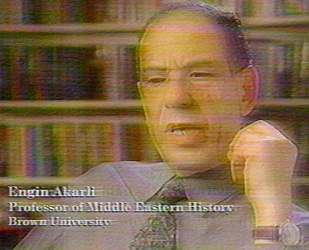 |
|
The
Turkish Scholar |
Sometimes people have other
motivating factors besides the truth. The first time I heard about a Turkish scholar
(someone other than Engin Akarli) supporting the Armenian “Genocide,” my ears
pricked up. Whoa! He’s Turkish, and he thinks the “Genocide” really happened?
My first thought was, maybe he has come upon some definitive evidence... and I
certainly wanted to learn more. As I said, the jury is still out... all people of
honor can rely on are the facts. So far, the facts overwhelmingly point to there
being no government sponsored genocide, and the evidence from the Armenian side
almost always turns out to be fraudulent. However, if suddenly a “Wannsee
Conference” sort of Ottoman Turkish meeting is trustworthily discovered (for
example), I would have to sigh and say... yes, those bastard Young Turks definitely
orchestrated the extermination of the Armenian people.
However, then I learned this other Turkish scholar had his own self-serving agenda;
not all Turks are “good,” and not all Armenians are “bad.” To think in such
terms would be racist. Turks can be just as susceptible to factors that have little
to do with the facts of the case. Maybe a Turkish professor figures espousing the
Armenian case would be a way to get the spotlight so desperately craved. Maybe a
Turk has bought into the endless anti-Turkish sentiments the West is constantly
bombarded by and has developed a prejudice against those of his own kind. (I’ve
met Germans with a sense of self-loathing, because of their being German; I’ve met
Jews who can be the worst anti-Semites.)
This is not to say Professor Engin Akarli is not a man of integrity. Because he has
a different view doesn’t mean I’m going to attack his credibility... that would
make me no better than the Armenians who are set to destroy the reputations of scholars they don’t agree with,
such as Professors Heath Lowry and Bernard Lewis. I know nothing about Professor
Engin Akarli. I certainly will keep my ears open to hear what he has to say. Maybe
he knows something more definitive than I do.
What I gathered about the way his interview was handled on the program was that the
professor initially appeared reluctant to use the word “genocide.” Only when the
filmmaker prodded him, did he use that particular word. (Once he was
"deflowered," he had no problem with repeating the word later.) It must be
kept in mind “genocide” is one of the most overused words in the English
language. Practically any killing of people can be referred to as a “genocide.”
People easily forget there has to be “specific intent,” as described by Article
II of the (1948 U.N.) convention... and the victims also must not be allied
politically, as the Armenians violently were, with the invading Russians. As a
result, what some British filmmakers hoped to present as the killing of British P.O.W.s in a
proposed film suddenly became a “genocide.” It sounds to me like the professor
was using the word “genocide” in a general sense, as he continued in a very “professorial”
way, speaking of issues that weren’t directly related to the Armenian “Genocide.”
However, this was only my impression.
"This is a question of
definition and nowadays the word 'genocide' is used very loosely even in cases where
no bloodshed is involved at all..."
Professor Bernard Lewis
Professor Justin McCarthy
offers his views on Turkish scholars
supporting the Armenian "Genocide."
After writing the above, I
came across a correspondence between Turks and Professor Akirli which was,
unfortunately (for me) written in Turkish, but I understood enough to get the gist
of it. After watching the PBS program, one Turk requested documentation to back up
the professor's claims, and the professor was kind enough to reply... unfortunately,
not with any documentation, and just his opinion. (Which is what Armenians are
really good at providing, instead of the facts, so the professor has something else
in common with the Armenians.) The main thrust of his argument was that the Young
Turks' Committee of Union and Progress had no right to accuse 400,000 Armenians,
particularly the women, children and elderly among them. "Because they did it
to us, we did it to them does not alleviate the guilt," the professor (paraphrasingly)
opined. Governments have a responsibility for all citizens. Yes, sometimes it's hard
to separate the innocent from the guilty, but sometimes it's easy, he went on to
write.
Who can argue with any of that? It's true... and I am the first to agree the Ottoman
government was guilty for not properly protecting the innocent Armenians who were
forced to relocate. The Ottoman government was equally guilty for not being able to
protect the hundreds of thousands of
Turks/Muslims who were slaughtered by the Armenians, perhaps even before the Russian
army swung by to lend the Ottoman-Armenians a helping hand.
In retrospect, it's easy to look at the tragic events transpired so long ago and say
from one's comfortable armchair, yes, the Ottomans were heavy-handed in their
response. However, I know from reading Henry Morgenthau's "Ambassador
Morgenthau's Story" that the situation was really desperate for the Ottoman
Empire. The nation was bankrupt, and "thousands of Turks were dying daily"... mainly because the
Turkish men were mobilized for the army, and there was no one to till the fields, or
to protect Turkish women and children from the marauding attacks of the revolting
Armenians. Famine and disease were everywhere, and every available man was needed at
multiple fronts when the nation was engaged in a desperate struggle for its very
life.
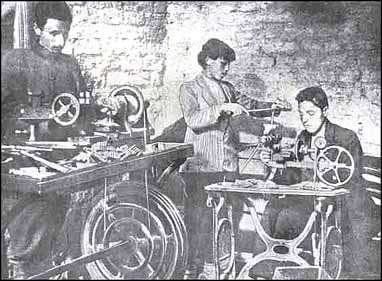 |
|
Armenian women helped with manufacturing bullets |
Yes, there were innocent
Armenians who didn't want to play a part in their leaders' treacherous directives,
but almost all complied; some did out of fear of knowing what happens to Armenians
who step out of line...
and many did so willingly, having planned for the opportune moment for years by
stockpiling weaponry, and sneakily waiting for the right moment to strike, when
their nation was at its weakest. When the whole community is supportive of such
treachery, willingly or not, whom do you trust? Women may not be at the front lines,
but they're helping with the manufacturing of bullets and the tending and feeding of
the revolutionaries. Children can be active participants, as American soldiers were
recently reminded with Iraqi kids during "Operation Iraqi Freedom"... in a
New York Times report on the heroes of Musa Dagh, an Armenian
bragged about how an Armenian child (Peter Gragosian) shot to death four Turkish soldiers. Did the Ottoman government
actually have the resources to investigate every family to determine who was loyal,
and who was not? How do you determine loyalty, anyway... by the way Armenian faces smile at
you? As Enver
Pasha said (in so many alleged words) in "Ambassador Morgenthau's
Story," you may have the luxury of making such determinations during
peacetime, but not with mighty mortal enemy Russia crashing through the gates and
with world powers England and France smashing through Mesopotamia and threatening
the Dardanelles.
"The women, armed with axes,
guns, daggers, and sticks, chased the Turkish prisoners who were escaping, and
killed most of them, only 56 of them were able to escape."
Diary of Aghasi [or
Aghassi], leader of 1895 Zeitun rebellion, p. 289 [as cited in "The
Armenian File"]
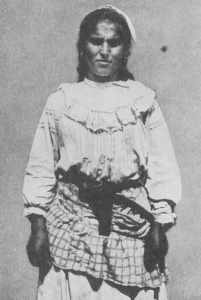 |
|
Armenian
woman with Browning
revolver. (Source: The Great World
War: A History, edited by Frank A.
Mumby, London, 1915-1917) |
"...Zeki Pasha had come down to
the station, evidently trying to escape, when some of these Armenian women
recognized him and attacked him savagely. To save his life, the British
soldiers locked him up..."
Rev. Ernest Partridge,
"The Pensacola Party and
Relief Work in Turkey," Armenian Affairs, Summer-Fall 1950, Vol.
I, No. 3-4, pp. 293-297
"When the Kurds burst the
village gates," said Miss Marcara, "we took rifles and mounted to
the roof. I fired eighty shots. The Kurds were forced to withdraw outside the
village wall. There I killed two and David two. Later we killed four more, one
of whom was the Chief."
"Elizabeth Marcara, an Armenian girl," as related in an April 26,
1915 New York Times article
entitled "Kurds Massacre More Armenians."
(This section keeps growing, and a page has now been devoted to the topic: Killer Armenian
Women)
|
We now can conclude America was a touch too xenophobic when the lives of
Japanese-Americans were ruined during WWII... but the Americans did it in a Western
country that was more "civilized" than how the Ottoman Empire is
perceived, at a time more modern almost thirty years later, and — this is most
important — with a people who did not betray their country... women, children and
elderly included.
Would Professor Akarli classify what happened to the Japanese-Americans as
"genocide"? Yes, their lives were not in danger as were the lives of some
of the Ottoman-Armenians being relocated... but America had no enemies immediately
knocking on her doors and had plenty of resources, relative modernity and manpower.
Armenians were killed during the relocation, but was that out of a
government-sponsored plan to deliberately exterminate them? If that's what you
believe, Professor Akarli, provide the hard evidence; otherwise, please educate
yourself on the meaning of "genocide."
I am not saying this "Turncoat Turk" is not genuine in his views, because
I don't know the man. I find it interesting, however, that he would consent to
appearing in such an uncompromisingly anti-Turkish program to express his views, in
a land that is so uncompromisingly anti-Turkish. Does he share an ethnicity like
(probably) Armin Theophil Wegner that
is not evident from the surface... what is his driving force? There are opportunists
who make names for themselves simply by being contrary... while I'm not saying Engin
Akarli acted upon such a motivation, what is clear to me is, if I didn't see him on
this program, I would have perhaps never heard of him... and probably, neither would
you.
OCT.
2005 ADDENDUM: I've seen some other
evidence that has softened my views on Prof. Akarli. While I still don't understand
why he allowed himself to be used on this program, and why he has attended
"genocide club" conferences, there are parts about him that I like, and
I'm no longer putting him in "Turncoat Turk" category.
|
| Creating
an Armenian Myth |
On the program, a female editor of an
Armenian magazine explained:
Armenians create their own Armenian myth wherever they go. One example of this is a man in
South Africa who lives alone; no other Armenians around him. Who felt the need for a
church. Built his own little church. An Armenian church. In the middle of nowhere.

NARRATOR: As Pulitzer Prize winning author William Saroyan understood, "When two
Armenians meet anywhere in the world, see if they will not create a New Armenia."
Well... this is an example of ethnic pride, and on one hand...
deservedly so. On the other hand... I find this attitude arrogant and even a little scary.
Imagine, this fellow is the only Armenian in a South African city or village, and he sets
up a whole institution of his Armenian-ness. And there are no other Armenians to share
this proud feeling of “Armenian-ness” with him..! Why didn’t he concentrate his
efforts on celebrating being a South African... since he is living among South Africans?
Why not do something the people who happen to be living with you can benefit by? Talk
about being self-centered.
Maybe this sort of attitude helps explain why members of the Armenian Diaspora aren’t
always loyal citizens of the nations they
live in. We already know this from the Ottoman Armenians (who sure tried to see to it to
“create a New Armenia”), but even here in America: the Armenian-Americans don’t seem
to care about American interests.
Turkey has been a rock, as far as being a Western ally. Whenever there are conflicts,
Turks are the first to pledge their support... as demonstrated during the 1991 Gulf War,
where Turkey’s invaluable cooperation made a huge difference (Turkey borders Iraq), even
at the expense of many billions (an estimated forty billion) of dollars of
financial loss. (One of the reasons that made the Turks think twice about mindlessly
supporting the USA during the second Gulf War, the first time Turkey has balked in going
along for the ride of Western adventurism.) With the largest European army in NATO, Turkey
was Western Europe’s first line of defense against Soviet expansionism. The Turkish
Brigade saved U.S. troops from annihilation
during the Korean war. Turkey is the only democratic Muslim country in a region where many
Islamic nations are often not that friendly to the United States. Turkey’s balance of
trade with the U.S. lately favors the U.S. The list goes on and on.
The Armenian-Americans don’t give a pig’s eye about any of that. By “bribing” American congressmen and politicians
who would sooner sell out American interests in order to get money and votes, the
Armenian-Americans don’t even bother with the consequences of alienating Turkey, this
great American and Western ally, as long as they can get their resolutions passed, in
recognition of the Armenian “Genocide.”
At least on one point I agree with
the female editor, when she said, "Armenians create their
own Armenian myth wherever they go."
Armenians have proven themselves to be experts when it comes to creating myths... such as
their own Myth of Innocence.
Instead of the truth of a human
disaster, a great myth has arisen, the myth of the Evil Turk and the Good Armenian.
The myth has been perpetuated by stories of the sufferings of the Armenians. The
stories are often true, but they never mention the equal or greater sufferings of
the Turks. The myth has been generally believed by non-Armenians because it fits
well into a larger, centuries-old myth — the Terrible Turk. To Europeans, who had
feared Turks for more than five centuries, the myth of the Armenian genocide seemed
just one more example of what they had been taught was the savagery of the Turk. It
spoke to a prejudice that had been nurtured by textbooks, sermons, folk tales, and
ancestral fears of the horsemen riding out of the East. The false image of the Turks
was too strong to be affected by facts.
Professor Justin
McCarthy, "Armenian Terrorism History as Poison and Antidote."
|
|
During the "Commercial Break"
|
"The
Armenians: Survival of a Nation” was presented by the Public Broadcasting
System (PBS) during “Pledge Week.” (As American public television is
non-commercial, the network’s local stations appeal to the viewing audience to
raise money. Airing “special” programs helps to get viewers to become members.)
When the show aired in New York City the first time, two guests that appeared with
the station personnel were the producer and director of the program, Andrew
Goldberg, and one of the interviewees of the program, author Peter Balakian (his
book credit is subtitled, “An American Son Uncovers His Armenian Past.”) What
they had to say during the money-raising station breaks was interesting.
Andrew Goldberg also produced and directed 2000's
"The Armenian-Americans"; people involved in one way or another in this
90-minute exercise (mostly, if not all, as interviewed subjects) were tennis player
Andre Agassi, Mike "Mannix" Connors (Krikor Ohanian), Eric Bogossian,
SCTV's wonderful Andrea Martin (whose gramps emigrated in the early 1900s from
Ottoman Turkey, and changed the family name from Papazian), NCAA basketball coach
Jerry Tarkanian and good old Peter Balakian.
Goldberg: I have to say, there were numerous efforts to stop me from telling this
story properly...
PBS: Your life was in danger at one point.
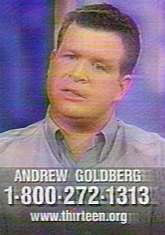 |
|
The
Producer/Director
|
Goldberg: At one point, yeah. When we were in Turkey, ahh... in a
village, the Turkish soldiers came. With machine guns. And said to us, Are you
journalists doing a story on the genocide. And they took us back to their base camp.
I mean, it's rather terrifying. I mean, you don't expect that to happen walking down
the street and suddenly having the American military point guns at you just for
being a journalist. And there were so many attempts to do it, and, you know, I came
to this with what I thought was a Jewish consciousness about that I was taught these
types of, y'know, with the Holocaust, there's no room for
revisionism, the truth must be told, history must be told the way it happened.
And that's why I went as far as I needed to go to get this. That's what makes Public
Television so special. This is where we can tell these stories.
Hmm. So according to Mr. Goldberg, the first accepted version
of a story is the truth, and anything that comes afterwards to try to correct the
inaccuracies would be “revisionism.” That would mean if the Nazis were still in
power, all the lies they spread about the Jews would need to be accepted as the
gospel truth. I guess Mr. Goldberg must still then believe the American Indians were
the real historical savages.
Benjamin Franklin once said that generally historians do not write what has really
happened but what they want to believe in. Obviously, history is a matter of
perspective. Mr. Goldberg has nerve to proclaim the material in his program
represents the truth to the exclusion of “revisionism,” when his sponsor was the
Manoogian Simone Foundation. How do you spell “conflict of interest”?
A reviewer for the book, Death And
Exile: The Ethnic Cleansing of Ottoman Muslims, put the concept of
"revisionism" beautifully:
In fact, revising
one-sided history and changing deficient traditional wisdom is the business of the
historian, and in few areas of history is revision so needed as in the history of
the Ottoman peoples.
Regarding his story illustrating the uncivilized nature of the Turks (“I
mean, it's rather terrifying. I mean, you don't expect that to happen walking down
the street and suddenly having the American military point guns at you just for
being a journalist”): There are a few things Mr. Goldberg
would do well to bear in mind. For one thing, a true “journalist” does not look
at just one side of a story. One who presents a one-sided story is either an
unethical or incompetent journalist or a “propagandist.” Also, Mr. Goldberg was
not in America; how chauvinistic to assume every nation must precisely follow
America’s Constitution. For example, dare to proclaim there is no Armenian “Genocide”
in France, a Western nation with limited freedom of speech, and you might well wind up in prison. And it’s
not as though heavy-handed treatment by American police is the most
unheard-of concept.
I don’t know if Mr. Goldberg meant that guns were being pointed at him in a
literal way... sounds like he meant it as a figure of speech. If he was
exaggerating, then since when does the process of being questioned by the police put
one’s life “in danger”? What a desperate attempt to reinforce the impression
of the Turks’ cruelty, as depicted in the one-sided program he has produced.
Secondly, the Turks have learned from how welcoming foreign journalists and media
people with open arms, in the traditional style of Turkish hospitality, has
backfired time and again. (For example, the lying producers of MIDNIGHT EXPRESS claimed they were
shooting a documentary, in order to get permission to shoot establishing shots
for their racist production.) If you know you’re going to be at the receiving end
of an expertly orchestrated campaign whose only purpose is to hurl mud at you, it
would be natural to take some precautionary measures. There would be no way to stop
Mr. Goldberg from telling his subjective story, anyway; the Turkish authorities must
have figured they were going to get pierced no matter what, but there would be no
reason to supply Mr. Goldberg with all of the arrows.
Lastly, Andrew Goldberg’s “Jewish consciousness” might make his Armenian
sponsors giddy with delight, as aware as they are of the sympathy-stirring value of
connecting the Holocaust to the Armenian “Genocide”... however, he is far from
doing the Jewish victims of World War II a favor by putting these unequal stories on
an equal plane.
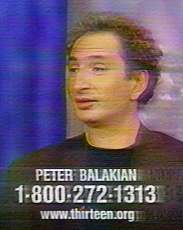 |
|
CLICK
ON THE PIC to hear
Mr. "Double Killing"
|
When the discussion turned to
why the Turkish government does not recognize the Armenian “Genocide,” Peter
Balakian added (using a phrase of Elie Wiesel's) that the Turks were guilty of a “double
killing.” Since the precedent for the first imaginary genocide has already
been so firmly established, perhaps it’s only appropriate that a second imaginary
genocide should follow. (Probably the Turkish government will not accept the
responsibility for this second genocide, in which case it will be time for a “triple
killing.” The more the imaginary genocides, the better the chance of getting even
more sympathy... followed by the possibility of reparations.) Perhaps what Mr. Balakian,
if he considers himself to be a fair man, should ask is the following question...
put so eloquently by Dr. Turhan Baykan (in his article, “On Turkish Suffering”):
Why do the Armenians insist on an apology from us? I believe that any sensitive
person would not ask anybody else to apologize for their parents’ sin. If they
insist on it, as Armenians do nowadays, then I would suspect that they may have a
ulterior motive in doing so, such as propaganda or politics.
The pledge drive break within the program provided for PBS representative Denise
(Richardson?) to interview one of the volunteers who was handling the telephones.
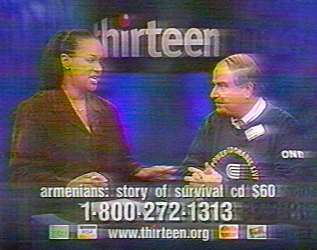 |
|
Was
this program made for the PUBLIC, or for Armenians?
|
PBS: With me now is Armen Nishanian, one of our volunteers... and a
member of the New York Armenian community... why are you proud to be here,
particularly tonight?
Nishanian: ...Also, as an Armenian-American, it's a tremendous opportunity. And a
tremendous honor for me to be here, I'm thrilled...
PBS: Okay. Well, these phones have lit up. But for those who may be sitting home
saying, well, my neighbor will call. What do you say to the Armenian community right
now?
Nishanian: I think what the Armenian community should be doing is getting on the
phone, making a pledge...
Perhaps America’s Public Broadcasting System should be
reminded their duty is to represent the public as a whole, and not just select
ethnic groups... and they should not engage in the practice of excluding
less-advantaged groups, who don’t have the means to purchase television air time
(along with American politicians).
|
| Other Biased, Armenian Butt-Kissing PBS Shows: |
|
|